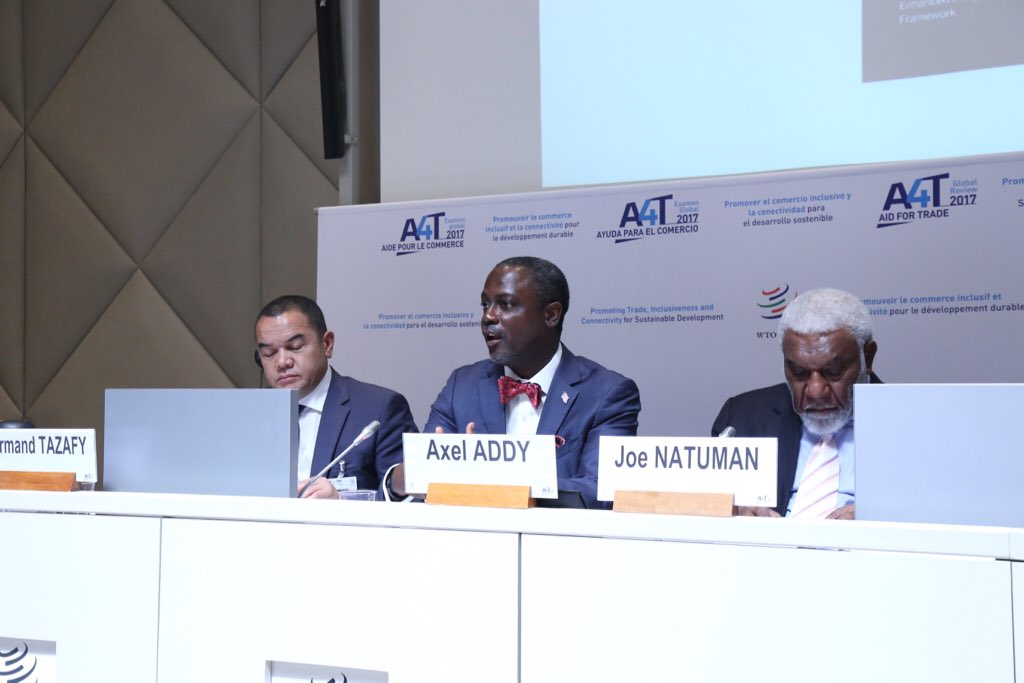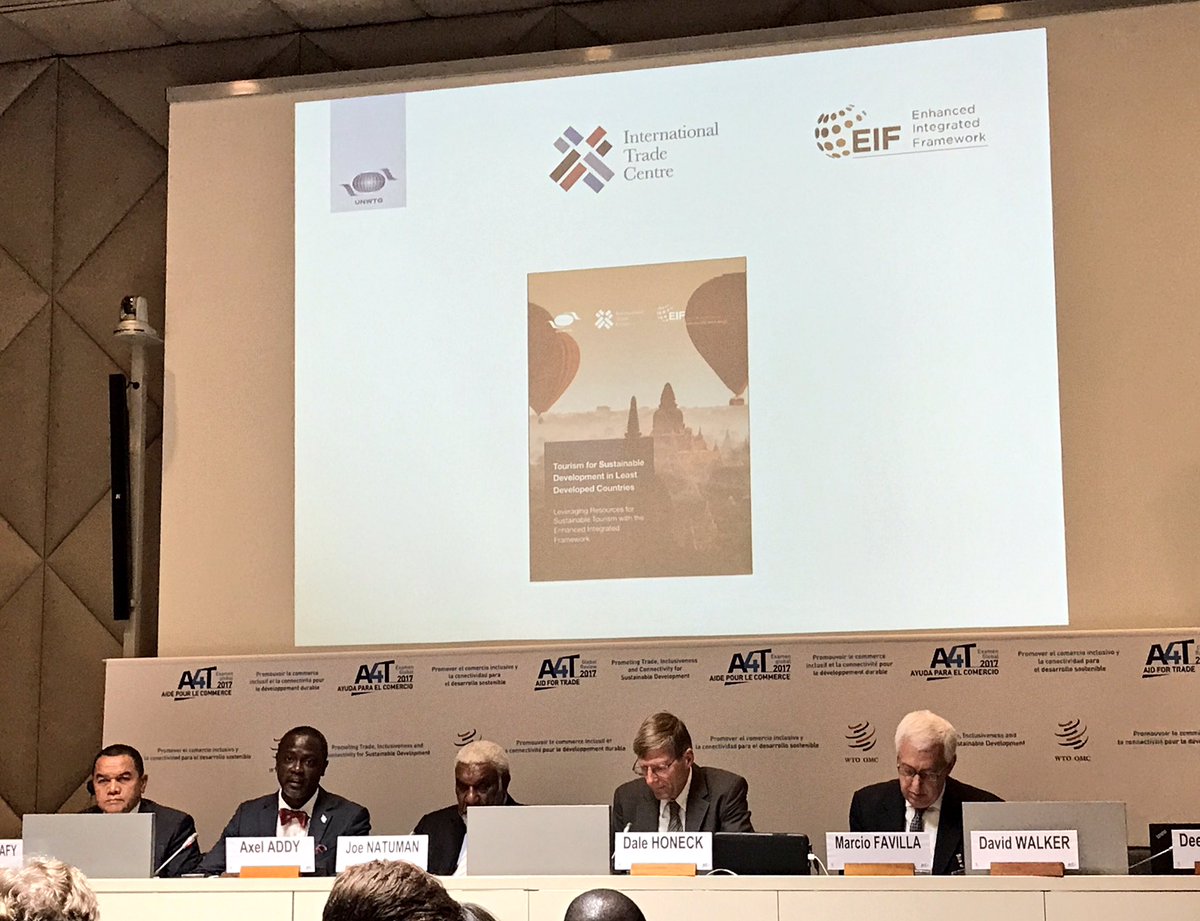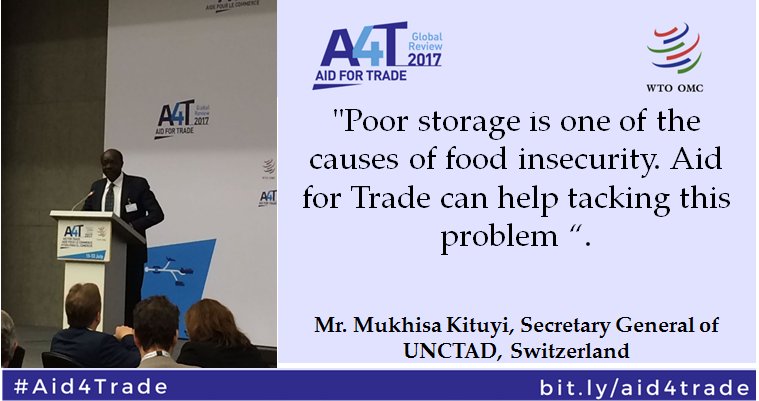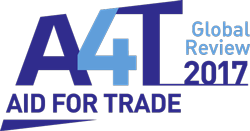11 – 13 July 2017. Geneva. Global Review 2017 of Aid for Trade, “Promoting Trade, Inclusiveness and Connectivity For Sustainable Development”.
 Underpinning the Review is a monitoring and evaluation (M&E) exercise. The aim of the M&E exercise is to survey: Aid-for-Trade priorities and how these have changed; the status of Trade Facilitation Agreement implementation and support; engagement in, and support to, the development of e-commerce; and infrastructure investment, the development of related services markets and related investment climate reforms.
Underpinning the Review is a monitoring and evaluation (M&E) exercise. The aim of the M&E exercise is to survey: Aid-for-Trade priorities and how these have changed; the status of Trade Facilitation Agreement implementation and support; engagement in, and support to, the development of e-commerce; and infrastructure investment, the development of related services markets and related investment climate reforms.
 The Aid for Trade Global Review 2015 highlighted how high trade costs slow growth and development by pricing many suppliers in developing and least developed countries out of global markets. The 2017 Global Review develops this theme further by extending analysis of trade costs into the area of digital connectivity. The Review will discuss the economic consequences of the digital divide and strategies to help policymakers, firms, women and SMEs to bridge this divide.
The Aid for Trade Global Review 2015 highlighted how high trade costs slow growth and development by pricing many suppliers in developing and least developed countries out of global markets. The 2017 Global Review develops this theme further by extending analysis of trade costs into the area of digital connectivity. The Review will discuss the economic consequences of the digital divide and strategies to help policymakers, firms, women and SMEs to bridge this divide.
 One tool at the disposal of trade policymakers to reduce logistics trade costs is the WTO Trade Facilitation Agreement (TFA) that entered into force on 22 February2015 World Trade Report outlined the inclusive trade outcomes that may be achieved though trade facilitation reforms. This issue will be further examined during the 2017 Global Review.
One tool at the disposal of trade policymakers to reduce logistics trade costs is the WTO Trade Facilitation Agreement (TFA) that entered into force on 22 February2015 World Trade Report outlined the inclusive trade outcomes that may be achieved though trade facilitation reforms. This issue will be further examined during the 2017 Global Review.
2017. The
 Discussions will be informed by the Aid for Trade at a Glance report, published jointly by the World Trade Organization and the Organisation for Economic Co-operation and Development, with contributions from Business for eTrade Development, the Enhanced Integrated Framework, the International Telecommunications Union, the International Trade Centre, the United Nations Conference on Trade and Development and the World Bank Group. Additional analysis will be contributed by regional development banks and other stakeholders.
Discussions will be informed by the Aid for Trade at a Glance report, published jointly by the World Trade Organization and the Organisation for Economic Co-operation and Development, with contributions from Business for eTrade Development, the Enhanced Integrated Framework, the International Telecommunications Union, the International Trade Centre, the United Nations Conference on Trade and Development and the World Bank Group. Additional analysis will be contributed by regional development banks and other stakeholders.
Below video starts @ the 40th min’
SESSION 11 : REGIONAL FOCUS
Promoting Connectivity In Africa – The Role of Aid for Trade in Boosting Intra-African Trade
SESSION 32 : SIDE EVENT Connecting Trade and Agricultural Development in the LDCs Agriculture is a critical component of Aid for Trade and the largest contributor within productive capacity, contributing on average between 15% and 20% of all Aid-for-Trade flows. This should not be surprising given the importance of agriculture to trade in LDCs, a sector providing 69% of total employment, with half being women (UNCTAD).
Connecting Trade and Agricultural Development in the LDCs Agriculture is a critical component of Aid for Trade and the largest contributor within productive capacity, contributing on average between 15% and 20% of all Aid-for-Trade flows. This should not be surprising given the importance of agriculture to trade in LDCs, a sector providing 69% of total employment, with half being women (UNCTAD).
Despite the synergic linkages between trade and agriculture in development, clear opportunities exist to better link agriculture and trade policy, processes and programmes in LDCs. For instance, the Comprehensive Africa Agriculture Development Programme (CAADP) of the African Union and the Enhanced Integrated Framework (EIF) provide institutional, policy and programming mechanisms for both agriculture and trade in African LDCs.
The Food and Agriculture Organization (FAO) has recently started a project in conjunction with the EIF and the European Centre for Development Policy Management (ECDPM) to pilot an approach to better connect the CAADP and EIF processes and improve the cross-sectoral linkages in four countries Mozambique, Rwanda, Tanzania and Zambia.
This workshop on “Connecting trade and agricultural development in LDCs” therefore aims to share the initial results of the project, and open the discussion to participants to explore the connections between agriculture and trade in development. The key themes will focus on collaboration, connecting siloes in agriculture and trade.
Moderator: Sean Woolfrey, The European Centre for Development Policy Management
Opening address:
Panel discussion:

SESSION 38 : THEMATIC FOCUS
Trade and Food Standards: Joint FAO-WTO Publication Launch
Trade in food is difficult to imagine without standards. Food standards give confidence to consumers about the safety, quality and authenticity of what they eat. By setting out a common understanding on different aspects of food for consumers, producers and governments, harmonization on the basis of international standards makes trade less costly and more inclusive. Food standards and trade go hand in hand in ensuring safe, nutritious and sufficient food for a growing world population.
Together, FAO and the WTO provide governments with the means to establish a framework to facilitate trade on the basis of internationally agreed food standards. Through the joint FAO/WHO Codex Alimentarius Commission, governments establish global science-based food standards that provide the foundation for achieving public health objectives such as food safety and nutrition. Since standards are essential for smooth trade, the WTO SPS and TBT Agreements strongly encourage governments to harmonize their requirements on the basis of international standards.
This publication emphasizes the importance of participation and engagement of governments in standards development in Codex and in resolving trade concerns in the WTO SPS and TBT Committees, as well as the importance of capacity development, which together contribute to the dynamism and robustness of the global system of food standards and trade.
Keynote addresses:
Moderator: Edwini Kessie, Director, Agriculture and Commodities Division, World Trade Organization
Presentations:
Source: PAEPARD FEED
by secretary
by secretary
by secretary
by secretary
by secretary
by secretary
by secretary
by secretary
by secretary
by secretary
by secretary
by secretary
by secretary
by secretary
by secretary
by secretary
by secretary
by secretary
by secretary
by secretary
by secretary
by secretary
by secretary
by secretary
by secretary
by secretary
by secretary
by secretary
by secretary
by secretary
by secretary
by secretary
by secretary
by secretary
by secretary
by secretary
by secretary
by secretary
by secretary
by secretary
by secretary
by secretary
by secretary
by secretary
by secretary
by secretary
by secretary
by secretary
by secretary
by secretary
by secretary
by secretary
by secretary
by secretary
by secretary
by secretary
by secretary
by secretary
by secretary
by secretary
by secretary
by secretary
by secretary
by secretary
by secretary
by secretary
by secretary
by secretary
by secretary
by secretary
by secretary
by secretary
by secretary
by secretary
by secretary
by secretary
by secretary
by secretary
by secretary
by secretary
by secretary
by secretary
by secretary
by secretary
by secretary
by secretary
by secretary
by secretary
by secretary
by secretary
by secretary
by secretary
by secretary
by secretary
by secretary
by secretary
by secretary
by secretary
by secretary
by secretary
by secretary
by secretary
by secretary
by secretary
by secretary
by secretary
by secretary
by secretary
by secretary
by secretary
by secretary
by secretary
by secretary
by secretary
by secretary
by secretary
by secretary
by secretary
by secretary
by secretary
by secretary
by secretary
by secretary
by secretary
by secretary
by secretary
by secretary
by secretary
by secretary
by secretary
by secretary
by secretary
by secretary
by secretary
by secretary
by secretary
by secretary
by secretary
by secretary
by secretary
by secretary
by secretary
by secretary
by secretary
by secretary
by secretary
by secretary
by secretary
by secretary
by secretary
by secretary
by secretary
by secretary
by secretary
by secretary
by secretary
by secretary
by secretary
by secretary
by secretary
by secretary
by secretary
by secretary
by secretary
by secretary
by secretary
by secretary
by secretary
by secretary
by secretary
by secretary
by secretary
by secretary
by secretary
by secretary
by secretary
by secretary
by secretary
by secretary
by secretary
by secretary
by secretary
by secretary
by secretary
by secretary
by secretary
by secretary
by secretary
by secretary
by secretary
by secretary
by secretary
by secretary
by secretary
by secretary
by secretary
by secretary
by secretary
by secretary
by secretary
by secretary
by secretary
by secretary
by secretary
by secretary
by secretary
by secretary
by secretary
by secretary
by secretary
by secretary
by secretary
by secretary
by secretary
by secretary
by secretary
by secretary
by secretary
by secretary
by secretary
by secretary
by secretary
by secretary
by secretary
by secretary
by secretary
by secretary
by secretary
by secretary
by secretary
by secretary
by secretary
by secretary
by secretary
by secretary
by secretary
by secretary
by secretary
by secretary
by secretary
by secretary
by secretary
by secretary
by secretary
by secretary
by secretary
by secretary
by secretary
by secretary
by secretary
by secretary
by secretary
by secretary
by secretary
by secretary
by secretary
by secretary
by secretary
by secretary
by secretary
by secretary
by secretary
by secretary
by secretary
by secretary
by secretary
by secretary
by secretary
by secretary
by secretary
by secretary
by secretary
by secretary
by secretary
by secretary
by secretary
by secretary
by secretary
by secretary
by secretary
by secretary
by secretary
by secretary
by secretary
by secretary
by secretary
by secretary
by secretary
by secretary
by secretary
by secretary
by secretary
by secretary
by secretary
by secretary
by secretary
by secretary
by secretary
by secretary
by secretary
by secretary
by secretary
by secretary
by secretary
by secretary
by secretary
by secretary
by secretary
by secretary
by secretary
by secretary
by secretary
by secretary
by secretary
by secretary
by secretary
by secretary
by secretary
by secretary
by secretary
by secretary
by secretary
by secretary
by secretary
by secretary
by secretary
by secretary
by secretary
by secretary
by secretary
by secretary
by secretary
by secretary
by secretary
by secretary
by secretary
by secretary
by secretary
by secretary
by secretary
by secretary
by secretary
by secretary
by secretary
by secretary
by secretary
by secretary
by secretary
by secretary
by secretary
by secretary
by secretary
by secretary
by secretary
by secretary
by secretary
by secretary
by secretary
by secretary
by secretary
by secretary
by secretary
by secretary
by secretary
by secretary
by secretary
by secretary
by secretary
by secretary
by secretary
by secretary
by secretary
by secretary
by secretary
by secretary
by secretary
by secretary
by secretary
by secretary
by secretary
by secretary
by secretary
by secretary
by secretary
by secretary
by secretary
by secretary
by secretary
by secretary
by secretary
by secretary
by secretary
by secretary
by secretary
by secretary
by secretary
by secretary
by secretary
by secretary
by secretary
by secretary
by secretary
by secretary
by secretary
by secretary
by secretary
by secretary
by secretary
by secretary
by secretary
by secretary
by secretary
by secretary
by secretary
by secretary
by secretary
by secretary
by secretary
by secretary
by secretary
by secretary
by secretary
by secretary
by secretary
by secretary
by secretary
by secretary
by secretary
by secretary
by secretary
by secretary
by secretary
by secretary
by secretary
by secretary
by secretary
by secretary
by secretary
by secretary
by secretary
by secretary
by secretary
by secretary
by secretary
by secretary
by secretary
by secretary
by secretary
by secretary
by secretary
by secretary
by secretary
by secretary
by secretary
by secretary
by secretary
by secretary
by secretary
by secretary
by secretary
by secretary
by secretary
by secretary
by secretary
by secretary
by secretary
by secretary
by secretary
by secretary
by secretary
by secretary
by secretary
by secretary
by secretary
by secretary
by secretary
by secretary
by secretary
by secretary
by secretary
by secretary
by secretary
by secretary
by secretary
by secretary
by secretary
by secretary
by secretary
by secretary
by secretary
by secretary
by secretary
by secretary
by secretary
by secretary
by secretary
by secretary
by secretary
by secretary
by secretary
by secretary
by secretary
by secretary
by secretary
by secretary
by secretary
by secretary
by secretary
by secretary
by secretary
by secretary
by secretary
by secretary
by secretary
by secretary
by secretary
by secretary
by secretary
by secretary
by secretary
by secretary
by secretary
by secretary
by secretary
by secretary
by secretary
by secretary
by secretary
by secretary
by secretary
by secretary
by secretary
by secretary
by secretary
by secretary
by secretary
by secretary
by secretary
by secretary
by secretary
by secretary
by secretary
by secretary
by secretary
by secretary
by secretary
by secretary
by secretary
by secretary
by secretary
by secretary
by secretary
by secretary
by secretary
by secretary
by secretary
by secretary
by secretary
by secretary
by secretary
by secretary
by secretary
by secretary
by secretary
by secretary
by secretary
by secretary
by secretary
by secretary
by secretary
by secretary
by secretary
by secretary
by secretary
by secretary
by secretary
by secretary
by secretary
by secretary
by secretary
by secretary
by secretary
by secretary
by secretary
by secretary
by secretary
by secretary
by secretary
by secretary
by secretary
by secretary
by secretary
by secretary
by secretary
by secretary
by secretary
by secretary
by secretary
by secretary
by secretary
by secretary
by secretary
by secretary
by secretary
by secretary
by secretary
by secretary
by secretary
by secretary
by secretary
by secretary
by secretary
by secretary
by secretary
by secretary
by secretary
by secretary
by secretary
by secretary
by secretary
by secretary
by secretary
by secretary
by secretary
by secretary
by secretary
by secretary
by secretary
by secretary
by secretary
by secretary
by secretary
by secretary
by secretary
by secretary
by secretary
by secretary
by secretary
by secretary
by secretary
by secretary
by secretary
by secretary
by secretary
by secretary
by secretary
by secretary
by secretary
by secretary
by secretary
by secretary
by secretary
by secretary
by secretary
by secretary
by secretary
by secretary
by secretary
by secretary
by secretary
by secretary
by secretary
by secretary
by secretary
by secretary
by secretary
by secretary
by secretary
by secretary
by secretary
by secretary
by secretary
by secretary
by secretary
by secretary
by secretary
by secretary
by secretary
by secretary
by secretary
by admin
by admin
by admin
by admin
by admin
by admin
by admin
by admin
by admin


